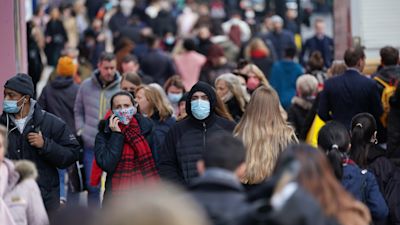Lockdowns 'should be last resort' to curb spread of Covid, WHO doctor says

'Lockdowns do work but the price you pay is very high'
Implementing lockdowns should be a "last resort" to curb the spread of Covid-19, an expert from the World Health Organization (WHO) has told ITV News.
Dr Margaret Harris, a public health doctor for the WHO, said lockdowns should not be completely ruled out - but that governments should enforce other public health measures first.
She said: "Lockdowns do work but the price you pay is very high - economically, socially, and the price individuals pay in mental health.
"It causes a lot of other consequences that are very difficult to deal with."
Listen to the latest episode of ITV News' podcast Coronavirus: What You Need To Know:
The doctor said reducing the number of opportunities for the virus to jump from person to person, through measures like social distancing, reducing meet-ups, wearing face coverings indoors and increasing ventilation inside "really do work".
She also reiterated the importance of getting people vaccinated, but said manufacturers need to make jabs in the countries that are "currently at the end of the queue" so they can inoculate populations faster.
Her comments came as the WHO on Tuesday warned "another storm" of Covid infections could push health systems across Europe to "the brink" as the Omicron variant rapidly spreads.
Countries across the continent are now looking to impose tough restrictions and lockdowns in response.
Some countries (like Germany, Austria and Italy) have imposed harsher restrictions for those who are not vaccinated, but Dr Harris said "it is not a good idea to be specifically stigmatising people who are not getting vaccinated". "What every one of us needs to do is try to understand why they're not vaccinated," she said.
"It's not simply always because they believe in misinformation or they're strongly anti-vaccination... There is so much more we can do to get people vaccinated - but the message really needs to be this is what will protect you from severe disease and death."
Dr Harris said experts do not yet know whether early reports of the Omicron variant causing milder symptoms is a sign that the virus is weakening, or whether people are developing more antibodies.
She said: "It is not clear yet whether the fewer numbers of people with severe disease that we've been seeing in South Africa is a result of that population already having 80% of people having had a previous infection of a previous version of SARS Covid. "We hope and think good vaccination coverage should hold it off, but the problem is it is a massively effective virus - it spreads through the population so rapidly that even if you've got most people vaccinated, you will still have that small percentage not vaccinated and they're the ones that will end up in hospital."